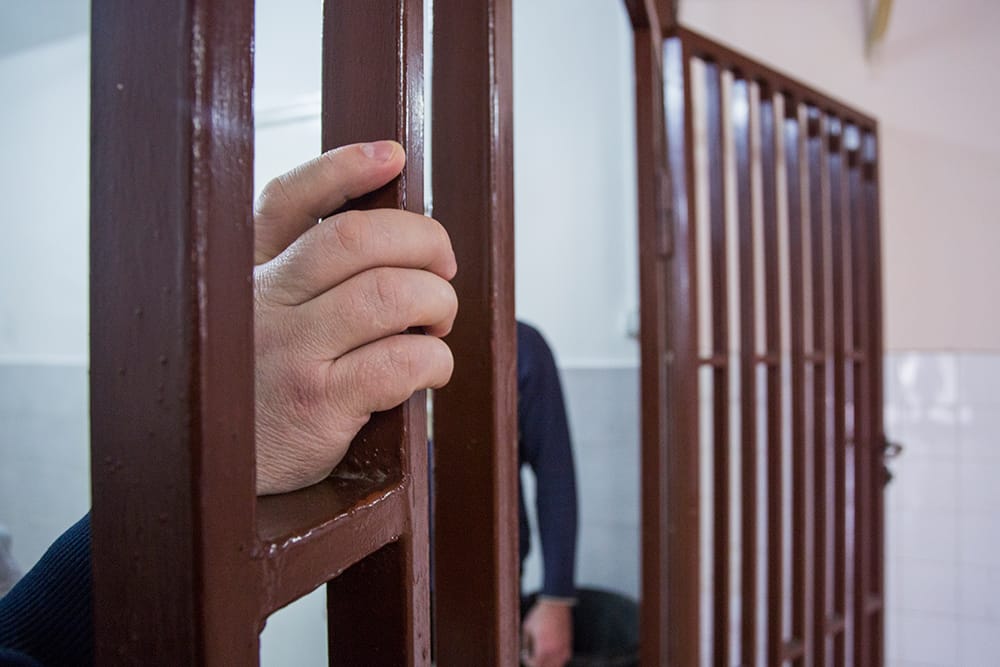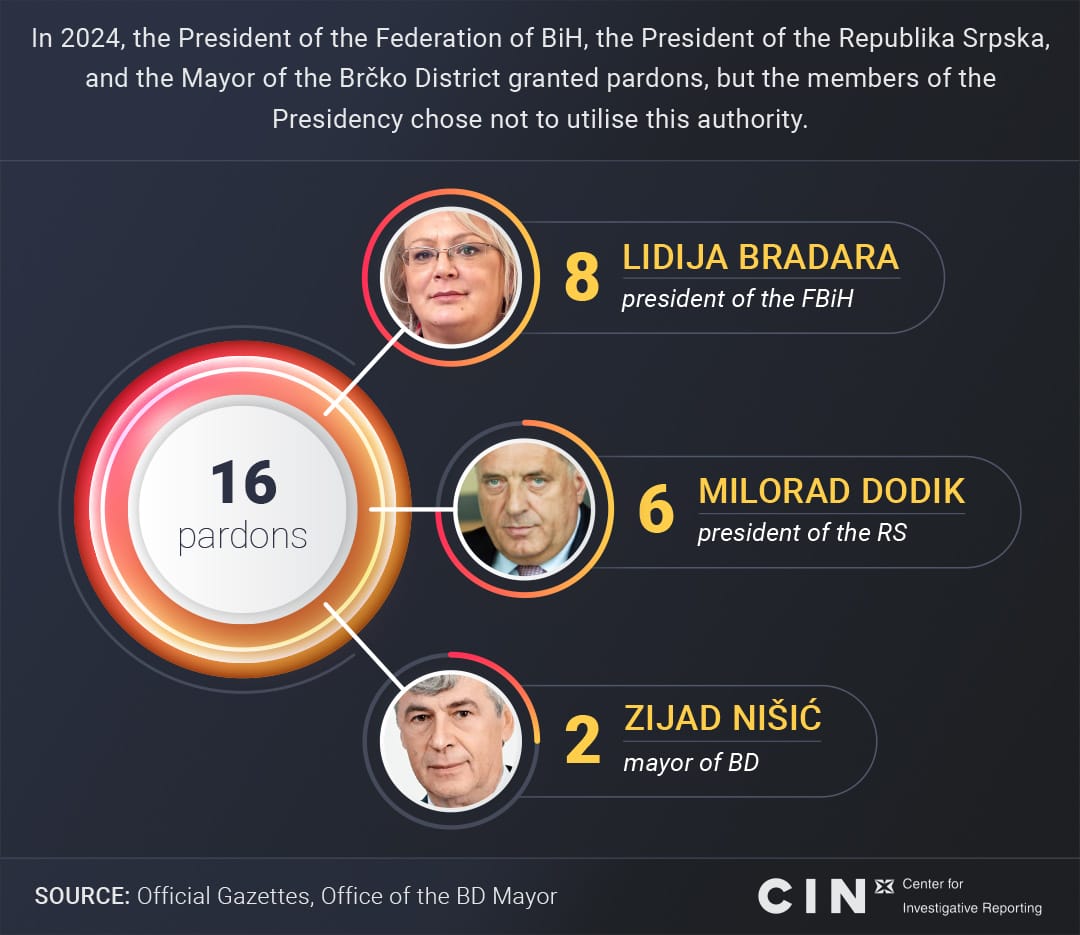The President of Republika Srpska (RS), Milorad Dodik, approved the expungement of a ten-month prison sentence for his party colleague from the Alliance of Independent Social Democrats (SNSD), Mladen Gajić, who was convicted of misconduct in public office, despite a warning from the Banja Luka District Court that such a decision undermines the authority of a final judgment and defeats the purpose of punishment.
In 2024, a total of 16 pardons were granted across Bosnia and Herzegovina—without any explanation provided in the official decisions, as the law does not require officials to justify their actions.
The majority of the pardons were granted by Dodik and the President of the Federation of Bosnia and Herzegovina (FBiH), Lidija Bradara, primarily involving conviction expungements or reductions in prison sentences.
In addition to entity presidents, members of the Presidency of Bosnia and Herzegovina (BiH) and the mayor of Brčko District also have the authority to grant pardons, which can modify or reduce sentences and expunge convictions. The law imposes no limits on how many pardons an official can grant or within what time frame.
For years, the Centre for Investigative Reporting (CIN) has been tracking the granting of leniencies in Bosnia and Herzegovina. Their findings show that officials often sign pardons without taking expert opinions into account.
Pardons by President Dodik
Mladen Gajić was convicted in July 2022 for breaking the law as the director of the public health institution (JZU) Hospital Sveti Apostol Luka in Doboj during the procurement of protective suits and masks amid the 2020 coronavirus pandemic. He made a deal with the Banja Luka-based travel agency Travel for Fun, which lacked a license to trade in medical supplies. It turned out that the delivered goods, which Gajić failed to properly inspect upon receipt, included welding and grinding goggles. The procurement was carried out through a negotiated procedure, without prior publication of a procurement notice.
The City of Doboj suffered a loss of more than BAM 82,000.
Gajić reached a deal with the RS Public Prosecutor’s Office to plead guilty, waiving his right to a trial where the public could learn the details of the procurement. As a result, he was sentenced to ten months in prison.
The ruling stated that Gajić could not be banned or restricted from working, as he was charged with a lesser offence – negligent conduct in office. He could not receive a harsher sentence, as the Prosecutor’s Office did not accuse him of endangering the lives of staff and patients by using inadequate equipment.
Gajić paid BAM 82,320 in damages to the City of Doboj and bought out the remaining seven months of his sentence for BAM 10,500. In 2023, he requested a pardon from his party leader, Milorad Dodik, seeking the best possible outcome—expunging his conviction. In his request, he stated that he would adhere to the legal order of Republika Srpska, refrain from committing new offences, highlight his educational background and academic credentials, and assert that having his conviction removed was essential for his professional advancement. Additionally, he noted that he had compensated the budget of Doboj, despite not being required to do so.
The Ministry of Justice of Republika Srpska, headed by Minister Miloš Bukejlović, a fellow party member from SNSD, had no objections. However, the Banja Luka District Court raised an objection. Judge Blagoje Dragosavljević, who issued the ruling, clarified that Gajić had already received all possible legal leniencies: his charge was reduced to a lesser offence, he entered into a plea agreement, and he paid to have his sentence commuted. Hence, granting a pardon would completely undermine the final ruling and hinder the intended deterrent effect of the punishment.
“(…) the convicted could still run for public office despite having committed a crime related to their duties, for which they were imprisoned”, wrote Judge Dragosavljević. He pointed out that Gajić’s claim of paying damages to the City of Doboj out of moral obligation and voluntarily was misleading; in reality, it was a requirement for the Court to approve his Plea Agreement with the Prosecutor’s Office.
The Court’s correspondence stressed that a criminal conviction record should bar individuals from holding public office again. It argued that granting a pardon solely to enable someone to return to office is unjustifiable, unacceptable, and undermines the authority and importance of a final judgement.
Despite the judge’s reasoning, President Dodik went ahead and granted a pardon to his party associate Gajić, subsequently backing him in his position as the director of the hospital in Doboj.
Gajić did not reply to inquiries from CIN, but his criminal defence lawyer, Siniša Mikić, mentioned that the only viable option for a pardon was to have the conviction erased: “He wasn’t doing him a favour by expunging it, as that would have occurred legally regardless.” He added that, after a certain period, sentences of up to three years in prison are automatically expunged by law, a process referred to as legal rehabilitation.

In 2024, Dodik granted pardons to six convicts.
Along with Gajić, three individuals who had been fined or placed on probation for bodily harm and assault had their convictions cleared. The other two, who were found guilty of endangering safety and abuse of power, were granted early release—one had their remaining prison sentence changed to a suspended sentence, while the other was fully pardoned.
Among those involved was Mirko Stojčinović, the former deputy public prosecutor of Republika Srpska, who was sentenced to two and a half years in prison by the Banja Luka District Court in July 2021 for abusing his office or authority. In 2016, he inappropriately withdrew an appeal while representing the City of Banja Luka in real estate matters worth over BAM 7.3 million. He also obstructed colleagues who wished to pursue the appeal for the benefit of the City.
In addition to his prison sentence, Stojčinović was barred from holding a civil service position for three years after the case concluded. In May 2023, he was sent to Doboj prison, from where he wrote to Dodik asking for his release from both prison and the imposed restrictions.
He mentioned that the National Assembly of Republika Srpska had appointed him as a public prosecutor, highlighting his successful career, his role as a founder of Republika Srpska, and his position as the commander of Doboj’s defence. He also noted that he was removed from his role as mayor by a decision from the High Representative, Paddy Ashdown. He referred to himself as a person who has been “vegetating” ever since he was placed in detention.
The Ministry of Justice of Republika Srpska was consulted again and expressed no objections to the request, while the Banja Luka District Court once again opposed the pardon. Judge Pane Gavrić, who initially sentenced the individual, noted that all pertinent factors had been considered during the sentencing process. The court explained that the prison sentence and restrictions on employment in state institutions were suitable for achieving the purpose of punishment, and that granting a pardon would contradict the Criminal Code of Republika Srpska.
However, Dodik disregarded the court’s rationale in this case as well. In July 2024, he signed the pardon, releasing Stojčinović from the remainder of his prison sentence.
After 17 months in prison, Stojčinović was released as a retiree with a pension of around BAM 1,400. Through his lawyer, he conveyed that he did not wish to comment on his case.
Pardons by President Bradara
In 2024, the Presidency of Bosnia and Herzegovina did not issue any pardons. However, the mayor of Brčko District at the time, Zijad Nišić, pardoned two individuals. One individual, who was found guilty of a serious offense against public safety, had his prison sentence reduced by six months, while the other, who was convicted of illegal drug production, had his conviction erased.

Last year, Lidija Bradara, the President of the Federation of Bosnia and Herzegovina, granted pardons to eight people who had been convicted of various offences, with most receiving reduced prison sentences.
One of those pardoned was Boro Bračić, the owner of Građevinska djelatnost Vlada from Grude, who was permitted by Bradara to serve less than 15 months of his sentence at the Mostar prison if he chose to do so. Bradara shortened his sentence by six months, allowing him the chance to redeem his time, as the criminal code allows for such options for sentences of up to one year. He has not taken that action yet, and his attorney, Ivana Grizelj Ćorluka, refused to comment on whether he will proceed without discussing it with her client.
In April 2024, Braćić was convicted of negligence as the owner of a construction firm after he neglected to set up a work and safety scaffold in mid-2018, which was meant to safeguard workers installing a roof on a building. Worker Ahmo Bećirović from Živinice fell from a height of six meters, and the court determined that Braćić’s oversight resulted in his death, which was classified as a serious criminal offence against safety of persons and property and improper construction practice.
The Municipal Court in Ljubuški found Braćić guilty of negligence rather than intent, but stressed that a prison sentence was necessary to fulfil the purpose of punishment. The court maintained that society needs to implement effective preventive measures to discourage potential offenders of such crimes.
However, Lidija Bradara, the President of the Federation of Bosnia and Herzegovina, disagreed and overturned the judicial panel’s decision just eight months after the verdict.
A similar opportunity was seized by Mirzeta Subašić, a member of the Party for a Better Future (SBB), who received a final sentence of one year and six months in prison for unlawfully hiring staff while serving as the director of the Health Insurance Institute of the Zenica-Doboj Canton.
She did not spend a single day in prison because the Municipal Court in Tešanj granted her postponement of her prison sentence, allowing her to await the pardon in July 2024 while free. With the pardon, Bradara shortened her sentence by six months, which was just enough time for her to either redeem the sentence or serve it at home with electronic monitoring.
Right after receiving the pardon, Subašić approached the court to request the option to pay her fine in instalments, as the total amount was too high to pay all at once. She also mentioned that serving her sentence with electronic monitoring would not be suitable due to her illness and the need for regular medical appointments.
Despite the law requiring that a substituted prison sentence be paid in full immediately, Zdravko Popović, the then-President of the Court, approved a request to allow the payment of BAM 36,000 in six instalments over a year.
Pardons issued by authorised officials from 2003 until the end of 2024 are recorded in a database maintained by the Centre for Investigative Journalism, which is publicly accessible through a simple search. This database contains various details, including the type of pardon, the officials who authorised them, and the names of the convicted individuals who received them.
The former President of the Federation of Bosnia and Herzegovina, Niko Lozančić, issued the most pardons, granting clemency to 460 convicted individuals between mid-2003 and mid-2005.











